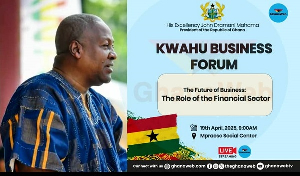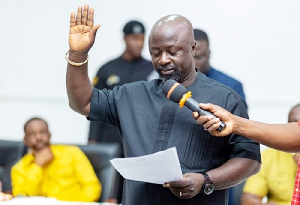Introduction
A lot of efforts have been put in by the various leaders and the founding fathers of the country to improve on science and technology in the country. There is the common understanding that in order for the country to develop and be self sufficient it has to reduce its reliance on the importation of science and technology from the developed nations. There have therefore been several calls for the country to manufacture its own machinery and equipments to support its industries as well as other sectors of the economy. For instance we should be able to produce the necessary farm inputs like harrowers, ploughs, harvesters, tractors etc required by farmers to produce on large scales to feed the nation.
The country has invested a lot in a bid to develop science and technology over the years. The first president of Ghana, a great visionary and a genius was at the fore front in the crusade of industrialisation. He realised that in order for the country to develop there is the need to train our own scientists, engineers, doctors etc. His vision led to the establishment of one of the finest science and technology institutions in the country. Graduates from this and other institutions were offered scholarships to developed countries to acquire knowledge and the necessary skills required to push the industrial revolution through.
Investing in science and technology
The bid to develop the sciences and technology was carried out by other noble leaders after Nkrumah. Attempts were made to get young and budding scientists interested in the subject at very tender ages. In support of this policy Ghana Education Service (GES) created Science Resource Centres in some selected schools in the 1980s. These schools have science laboratories which are equipped with state of the art science equipments for students’ experiments and project works.
Apart from the above the government invested a lot of funds in creating science colleges across the country. These colleges were to serve as fertile grounds for attracting prospective scientists. One school that benefited from this scheme is the Presbyterian Boys Secondary School (Presec, Legon). A science college was established in this school and this attracted very top and talented young science students in the country. Admissions to the science unit were very selective and competitive. The government to some extent tried to create a good environment required for the students to assimilate the scientific theories by providing special accommodation for the students. They were housed in very comfortable rooms that were well furnished. The returns on investing in science colleges at Presec and other science schools was very high because these schools produced very wonderful scientists some of whom have contributed positively to the nation’s development.
The research station
The drive to promote development through science and technology also led to the establishment of some wonderful research stations and centres. Some of these institutions over the years have carried out varied researches and come out with very wonderful findings. There is the Noguchi Memorial Institute for Medical Research at Legon which has been at the fore front in the fight against malaria, chronic and other communicable diseases. There is also the Council for Scientific and Industrial Research (CSIR). This research centre has some of our fine and talented scientists contributing in various ways in their respective ways.
The Oil Palm Research Institute of the CSIR has also contributed immensely to the development of the oil palm and coconut industries in Ghana. The institute has been involved in the production and distribution of over 25 million germinated oil palm seeds since 1969. It has also been involved in the development and production of coconut ecotypes tolerant to the Cape St. Paul Wilt Disease in Ghana. The Animal Research Stations have contributed largely to the development of the livestock industry in the country. Scientists working at this station have conducted researches on local grass pastures and have been able to identify suitable pastures for our cattle farmers. They have conducted successful trials with grass-legume combinations to produce higher herbage yields. A pest that really causes havoc in the cattle industry in Ghana is the tsetse fly. Our scientists in this station have developed a method of controlling this pest to keep the cattle business afloat. Methods like tsetse fly male sterilization technique using atomic radiation have been developed to eradicate this pest. They have also developed traditional herbal preparations for combating intestinal worm parasites of livestock. (http://www.csir.org.gh) It is amazing to know that at a time when nuclear reactors were not very common in Africa Ghana owned a nuclear reactor. This nuclear reactor based at Kwabenya has some of the finest scientists in the country working on several research projects. Currently they are leading the crusade for the call of the use of nuclear energy to reduce the over reliance on hydro power.
Ghanaian scientists
As a result of the country investing in the sciences and technology over the years it has produced some illustrious scientists and engineers who are contributing positively to the subject. We have very talented Ghanaian scientists working at NASA and other reputable organisations in the USA, Europe and other parts of the world. For instance we have Dr Ashitey Trebi-Ollennu, a Ghanaian engineer with the US space agency NASA. There is also Dr Michael Kwame Gbordzoe a renowned nuclear physicist in Germany. There is also our young talented US-based Ghanaian scientist, Dr Fred McBagonluri who happens to be my childhood friend. He recently won the covetous Black Engineer of the Year award in the Most Promising Scientist category in the US. These scholars are contributing positively to the development of the sciences for the benefit of mankind.
At the home front we have some wonderful science scholars who have come out with wonderful scientific theories and discoveries. Some of them even hold their own patents and receive royalties on these patents. For instance we have Prof Francis Allotey, Dr. Letitia Obeng, Professor Edward Akaho, Prof. John Justice Fletcher etc. One cannot over look the fact that it is the ingenuity of these noble scholars that have kept the wheels of the country running over the years. There are the wonderful medical doctors working under very difficult conditions in our hospitals. These doctors work under abysmal conditions giving treatment to our sons and daughters. We have the engineers playing very significant roles in the infrastructural development of the country. Also, Apostle (Dr) Kwadwo Sarfo and his team of engineers have also come out with some wonderful inventions in the area of science and technology.
Our Engineers/ Scientists and the banks
There is this trend going on in the country which is quite worrying. We have our talented students who have graduated as electrical, chemical, mechanical engineers etc taking up employment with the banks and other financial institutions because of lack of opportunities in their area of expertise. The argument of lack of opportunities put forward by our young scientists is perfectly right and I agree with them. However the crust of the matter is the country needs them for its development drives more than the banks. They have the talent and the capability that is why they are able to graduate as scientists. It is not everyone who can be one. You have to be gifted and a genius to be able to be a scientist. They must put this ingenuity into practice. For instance patents can be developed which can easily be sold to companies in Ghana or abroad. Patents can give royalties which they could depend on for their livelihood.
Engineering Sciences - Legon
There have been new developments on the University of Ghana, Legon campus in recent times which are quite encouraging. The new developments have placed this centre of excellence above its equals in the realms of academic prowess. The university among other things has invested heavily in human as well infrastructural development. A lot of expansion works is going on with new structures springing up here and there. The university in collaboration with other private firms are investing heavily in providing accommodation facilities to make life a lot more comfortable for students. A new student accommodation facility called ‘pentagon’ has sprung up on campus. The whole campus looks more beautiful with all the lawns and hedges well groomed. Its quite soul soothing to see such expansion works going on.
As part of the expansion drive the university has just recently established the Faculty of Engineering Sciences. This faculty is offering courses in Agricultural Engineering; Biomedical Engineering; Computer Engineering; Food Process Engineering and Material Sciences Engineering. The programme is said to be practical oriented thus will allow students to go on field attachments so they can apply theory to problems and issues required to improve human livelihood. In support of this noble course FINATRADE Foundation has offered 10 scholarships to students in Agriculture for four years and hopes to select five more students each year.
Admission policy
One area which most prospective students would love to see some changes is the admission policies of the universities. The current admissions policies of most of our tertiary institutions are not student friendly. Students have very little say in the choice of courses they are offered. In the end students pursue their courses with very little motivation. Students should be allowed to choose courses they feel they have the ability to pursue. This will bring out the best out of the students.
Apart from the above the admissions policies do not reflect the development needs of the country. Ghana is a developing country and therefore requires more human resources in certain sectors of the economy than others. Looking at the limited resources we have what needs to be done is to channel these limited resources into areas where they are most needed. The country needs more medical doctors, engineers, more scientists, more agriculturists etc. The country needs experts who can create things, scientists who have the brains to invent things to turn our fortunes around.
It is true we need the linguists, the philosophers, classical historians, the politicians but the majority of the students should not be pushed into reading these courses. They should not be forced into reading these courses because the heads of these departments want to save the departments from collapsing. Some of these courses are anachronistic and contribute very little to the development agenda of the country. Some of these courses have been discarded by the very foreign institutions that invented them but we are still hanging unto them. The University for Development Studies (UDS) is an institution that offers very excellent courses which are tailored to meet the development needs of the country. The same could be said of the private universities. They offer very innovative courses which are in high demand on the market.
Ghana has talents
The country abounds in many talents and there is the need to harness these talents for the common good. Talent is simply explained as something anyone can easily do when others struggle to do. The educational institutions are supposed to be aiming at helping students develop their talents not to waste them. Talent development is better handled in the basic and secondary schools compared to the tertiary institutions in the country. Tutors in the secondary schools have a one- to- one relation with students and understand their needs more. They easily identify high ability students and start to nurture them throughout their stay at the school. Some of these teachers give the students the necessary emotional and physical support they need to develop their talents.
All the efforts put in by these teachers at the basic and secondary school levels to develop the talents of our young ones are most often wasted by admission policies of our tertiary institutions. We have situations where very brilliant and talented students are denied the opportunity to read courses they can confidently handle and pass with ease. There are also situations where very high ability students who are well qualified to read medicine are denied the opportunity to pursue a career in this field because of some simple excuses.
This situation is quite pathetic considering the fact that our hospitals are always short of doctors. In some other countries people are motivated to offer science courses because they know the importance of the course. For instance in the UK they have the ‘golden hello’ schemes which offer cash rewards to students who want to train as tutors in science and other courses regarded as shortage areas.
Apart from that in some countries prospective medical students are not required to have a background in science subjects before they can read medicine or take up a profession in the field. It is time we break the myth surrounding the medical schools in our country and go modern. Whiles most countries are encouraging more students into the sciences we are doing otherwise. Some very brilliant and talented students who have all it takes to read medicine are refused the opportunity. Some of these students have spent all their lives dreaming of becoming doctors but these dreams and hopes are crushed by the very people who are paid by the tax payer to help them realise these dreams.
The Cost to the country, parents and students
The government spends huge sums of money to train graduates in the country. This cost involves cost of tuition which is free in Ghana and cost of paying salaries of lecturers and ancillary staff. There are other overhead costs like utility bills, medical bills, accommodation (for those living in the traditional halls) etc. When all these are cost quantified, the total cost of training graduates can be quite daunting.
Cost to parents is one area which could be stressful. Most parents invest heavily in their children’s education. This investment starts all the way from the nursery to the tertiary level. This involves buying text books, feeding, tuition etc. A lot of these parents deny themselves their today for their children’s tomorrow. They borrow just to keep their children at school only for their talents to be wasted by some mundane policies.
The poor students are not spared the brunt of the cost of education. Most of the students have to fend for themselves. Some of them have to virtually bear the cost of their own education at tender ages to the tertiary level. They starve and deny themselves the basic necessities of life.
The end results are most often damaging to the country, parents and society. This is because most often these students have to re-train themselves in other subjects that will make them more employable. Some of the well endowed students pay hard earned currency to enrol on professional courses like ACCA, CIMA, CA, and CIM while pursuing the unwanted courses on our campuses. The less unfortunate ones have to whimper in desperation and hope that a window of opportunity might pop up some day.
Innovations
The glimmer of hope is that most of these institutions have introduced very innovative courses. For instance KNUST recently introduced a programme in Aerospace Engineering. Legon has also established the School of Engineering. These are new innovations which when carried out properly will see the country becoming self sufficient in the sciences. The only thing at stake is that we should not train engineers who will end up working in the banks or financial institutions, engineers who cannot transform the knowledge they have acquired into reality. These schools should aim at training engineers who will design the machines and equipments we need in our industries and offices so that we do not have to import. They should be engineers who can restore some of the broken down equipments used by the very institutions that trained them.
For instance engineering students at Legon could try their hands at repairing the lifts at the annexes of the main halls on campus. These annexes in the distant past had lifts to save students occupying the higher floors the pains of climbing several stairs on their way to lectures and back. The lifts broke down decades ago and they have become white elephants. A lot of students have passed through those annexes without having the slightest clue that the doors directly opposite the main entrance to the annexes are the doors to these lifts.
Another thing they could try their hands on is revamping the now defunct Legon water pumping station. Legon in the past had its own water pumping station situated between the old Faculty of Law building and Electricity Company building on the Legon – Madina road. This pumping station had two huge underground reservoirs which when filled with water could meet the water needs of students. These underground reservoirs looked like bunkers and were well constructed to withstand the test of time. These once useful edifices are now lying in the belly of the earth wasting away while the perennial water problem facing Legon continues unabated. The buildings which once housed the pumping machines and other equipments have been taken over by rodents.
Engineering students at the KNUST should also try their hands at bringing back to life the once famous ‘Buame’ trucks designed by KNUST which made all of us proud. What about the mini robot designed by students at Presec? Our scientists should try and come out with of more of such lovely stuffs. We need to be more innovative and creative.
Civil Engineers and our roads
The country has a lot of celebrated civil engineers who have been brains behind the springing up of some skyscrapers littering the skies of Accra. Some of the architectural designs of these buildings are very amazing and nice to behold. These luminaries are also the forces behind the road construction works and interchanges across the country. One can proudly talk of the Sankara and Tetteh Quarshie interchanges, King Tackie Tawiah and Achimota overheads, the Accra – Aflao, Accra - Kumasi roads etc.
However one sometimes marvels at the judgements of some of these engineers, particularly the judgement of the engineers who supervised the construction of a section of the Kumasi – Ejisu road. This road is a dual carriage road all the way from the Kumasi city centre through KNUST to a roundabout a little beyond KNUST. Strangely enough the road is reduced to a single lane at the roundabout. The purpose of a roundabout is to allow free flow of traffic, so for the engineers to change a double lane road to a single lane at that point is blight on a good work done. One would expect them to rather change the road into a three way lane. There should be a central lane for motorists going right across and right and left lanes for motorists going either way.
The single lane on such a busy road only creates massive traffic jams and unnecessary delays which could have been avoided. The same thing could be said of the Spintex- Tetteh Quarshie Intersection road. Spintex road has become a very busy road with daily heavy traffic. This is as a result of the springing up of residential facilities in the area. The building of a shopping mall in the area has deteriorated an already precarious situation and added to the woes of the motorists in the area. The building of the mall itself is an excellent idea but the engineers that supervised the project made little provision for access to the mall.
The road from the Spintex- Tetteh Quarshie Intersection is a single lane but with the construction of the mall this could have been widened to a double lane just at the entrance to the mall. This would have made it possible for shoppers going to the mall from Spintex to veer off the main road to the shopping mall without having to stay in the same lane as motorist going to Accra or other places.
Conclusion
The prospect of the development of science and technology in Ghana is dwindling and a lot need to be done to resuscitate these very important fields of study. Currently graduates in the field complain of lack of opportunities for further development after graduation. They argued that the few science institutions and research stations in the country are already saturated and therefore they have very little chances to enhance their talents.
This circumstance has resulted in a situation where some of these potential scientists seek greener pastures in other fields like accounting, finance etc. Usually some of these talented scientists join the exodus wagon to other countries where they are considered useful. Those who stay behind decide to work at the banks and other financial institutions.
Francis Kwaku Egu (Finance & Investment Analyst), UK
Research Associate- Licensed International Financial Analyst (LIFA) –USA
kwakuhull@yahoo.com
Opinions of Friday, 24 April 2009
Columnist: Egu, Francis Kwaku




![Thomas Partey [L] in a hug with Coach, Mikel Aterta Thomas Partey [L] in a hug with Coach, Mikel Aterta](https://cdn.ghanaweb.com/imagelib/pics/715/71574503.295.jpg)









